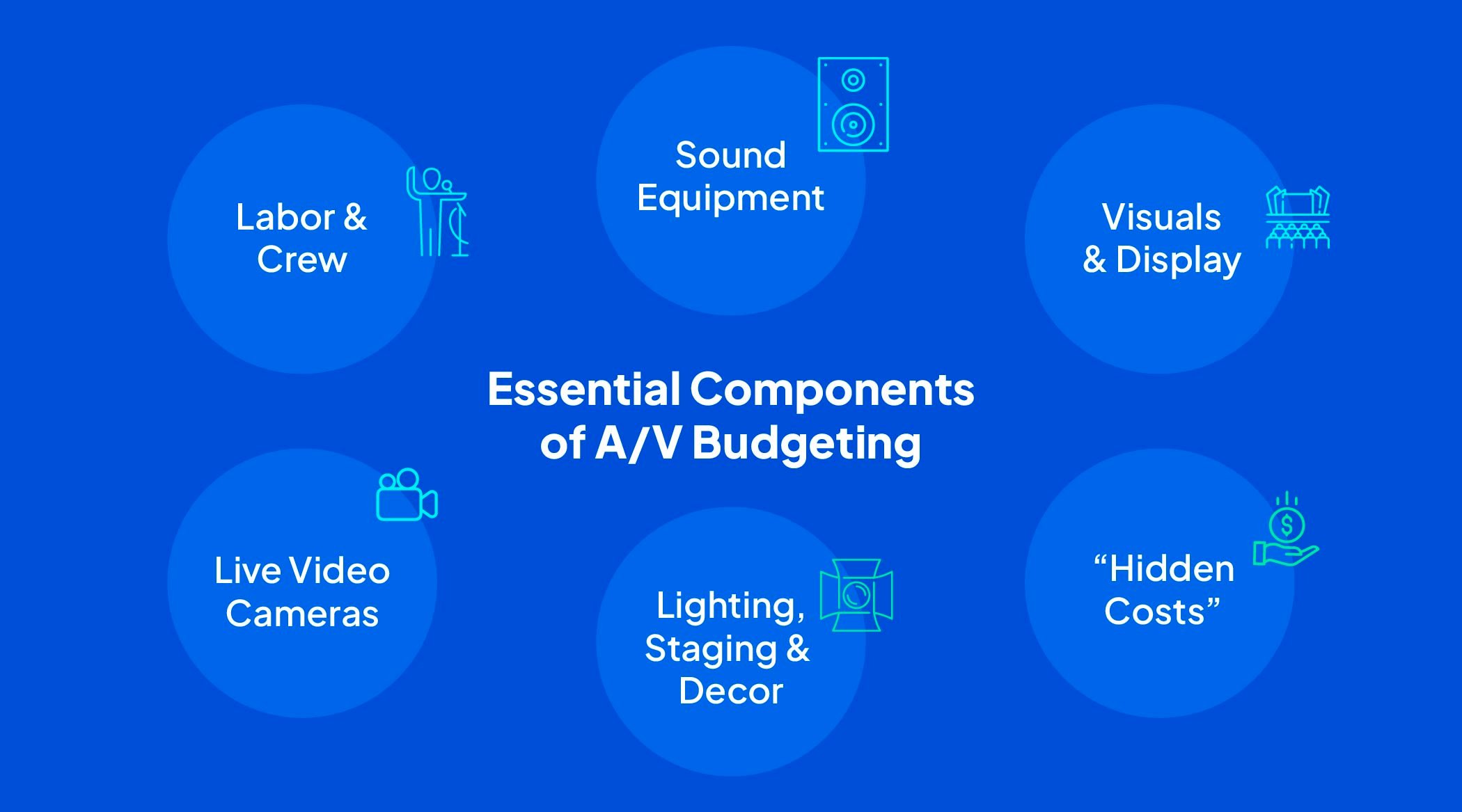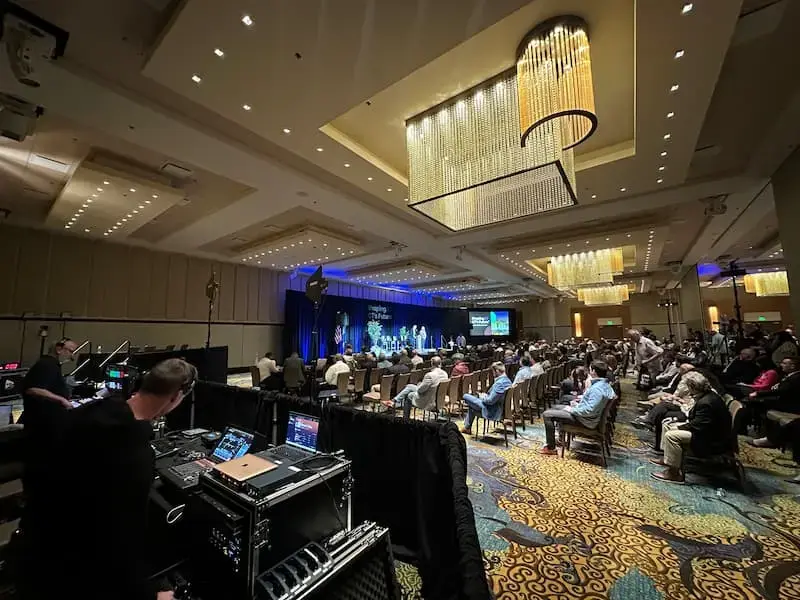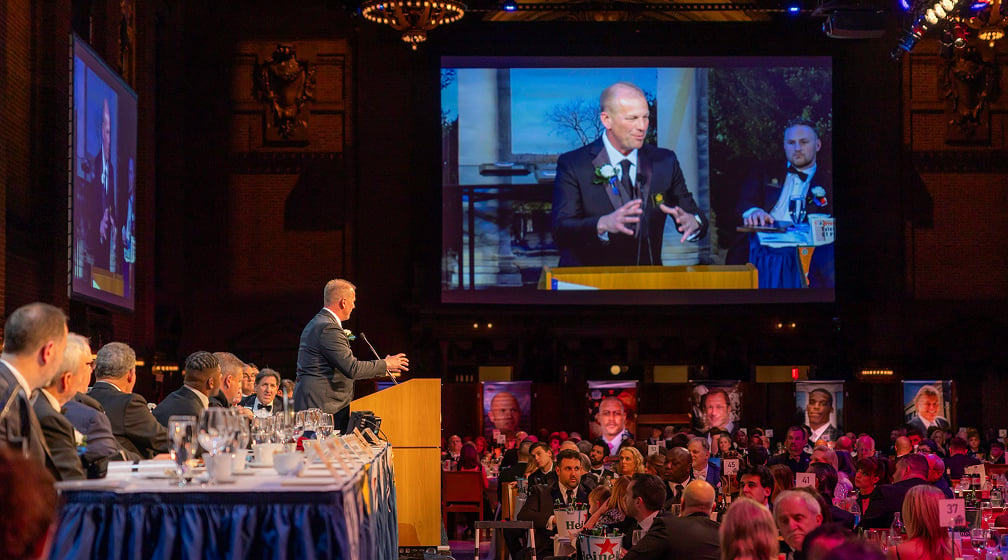Introduction
Whether you’re organizing a corporate seminar, gala dinner, product launch, or hybrid conference, AV is the thread that ties your content, brand, and audience experience together.
Experienced planner professionals have a good sense of what AV should cost for their next event. Too often, they are not willing to share their planned spending number with the AV Production partner, which can cause misalignment between the requestor and the proposal. This is especially true when planners use the budget from a prior event with a different scope and compare it to something different.
This article serves as a guide to understanding what influences the budget to go up or down. By understanding how changes in scope change the budget, planners can communicate clearly with their partners for smoother negotiations.
Where: the venue and the city
Big city venues come with higher costs. Items that increase the cost include: labor rates, expenses like crew parking, meals, and hotels, and even general equipment costs when compared to more suburban locations. These venues tend to have in-house AV contracts, which can drive up costs with corkage fees, shadow labor, and other penalties.
When: Time and Schedule
What time does the event start and end? Do you need presenter rehearsals? An early-morning event should require setup on the day prior (or even overnight), which has effectively doubled your labor costs. Equipment is typically priced per day, so a multi-day event will not only incur additional labor, but also equipment charges as well.
A “Short Turn” is the time between when the crew is released on one day and starts on the next. Contracts may require that the crew be provided with hotel rooms, meals and possibly overtime depending on the schedule.
Who: Audience Size and Content Format
The number of attendees and the content will dictate the equipment and crew required to run your event. As the audience grows and the content becomes more detailed or complex, the costs go up. When you add multiple presenters or panelists, your event requires more microphones. Large audiences benefit from I-mag, which then requires cameras with operators and additional video screens—all increasing costs.
Why: Event Objectives
A classroom training event might only require basic AV at a basic cost. A product launch or sales kick-off event demands shock-and-awe-style AV and production.
Essential Components of A/V Budgeting
Once your scope is defined, the next step is to break down the budget into its core components. While costs vary by vendor, the following categories apply to nearly every AV setup.
Logistics and Crew
Trucking
The equipment needs to get to the event site (and off-site at the end) and may require one or more dedicated vehicles and drivers. Scale, schedule and location are all factors in the cost of trucking.
Setup and Strike
Your AV Production partner knows how much time and how many people will be required to set up your event to be ready by rehearsals or showtime. The number of loaders, stagehands, and setup techs will vary, but trust their experience.
Running Crew
This is the team that will handle the operation of the equipment during your event. Remember that even the most seasoned technician can only focus on one job at a time effectively. As your project grows in scale and complexity, you may see a dedicated crew for specific tasks and wonder if you need all those people. You do.
- Audio Engineer - runs the mixer
- A2 or Audio Assistant - handles microphones on and off stage
- Technical Director or Vision Mixer - switches between video sources as instructed by the director
- Director - monitors all content and cameras and directs the operators with cues and instructions
- Media/Graphics Op - runs video playback and overlay graphics
- PowerPoint Op – runs PowerPoint and helps to keep the decks organized and normalized
- Camera Op – runs studio-style camera
- PTZ Camera Op – runs robotic cameras and can handle as many as 3 cameras at once
- Lighting Designer – develops and executes the lighting plan, runs the system during the event
- Lighting Tech – setup and removal of lighting equipment
A Fireside Chat has different crewing requirements than a TedX-style event and even different from rotating panel discussions.
If your event requires breakout sessions, you may also see a separate, dedicated team for those rooms.
Equipment and Technology
Audio and Sound
Audio systems are designed considering many factors related to the scope of your event. For each factor, as the number or complexity increases, the size and cost of the overall audio system and crew will increase.
Some factors include:
- Number of presenters – determines how many microphones are needed
- Number of attendees – affects the size and design of speakers and amplifiers
- Acoustical properties of the venue – carpeting, concrete, glass, raked seating, and outdoor spaces all impact sound differently
- Other media sources – music, video playback, and remote presenters add input requirements for the mixer
- Entertainment and music performance – performing artists may require specific setups outlined in a Rider, often different from spoken word events
Visuals and Display
Visual systems include large LED monitors, video projection screens, and LED Walls. The design will consider a balance between the content on screen and the impact on the audience. For example, a presentation with detailed slides will require a screen large enough for the entire audience to read clearly (or multiple smaller screens). A fireside chat-style corporate event might have no content, eliminating the need for screens altogether.
Confidence monitors display the presenters’ slides, allowing them to simply glance down and not break eye contact with the audience. Many presenters now include notes on these monitors in addition to their slides, which requires two displays as well as additional equipment for engineering; a small but noteworthy increase in costs.
Cameras and Video
Almost all events are worth video recording. This, along with streaming or hybrid, may require that your event include cameras, recorders, engineering, and skilled operators. Simply recording a speech for the archive has very basic requirements.
Factors that can rapidly increase the budget might include:
- Online audience engagement – a live stream or hybrid event benefits from two or more camera angles that can be switched live.
- I-Mag – big audiences seated at a distance from the stage need I-Mag to remain engaged.
- Complex on-stage action – large panel discussions, debates, entertainment, all benefit from having three or more camera angles possibly including a handheld operator on stage.
- Off-stage action – events like commencements or corporate award presentations can benefit from placing cameras in areas away from the stage. Capturing the graduate procession creates excitement for the families watching the live stream.
Lighting
Lighting systems come in all shapes and sizes, and the production company needs to carefully choose between what is required and what’s nice-to-have. Labor, ground support vs. rigging, and power are important considerations that impact the budget.
It all comes down to the event experience for the viewer. The following factors make event lighting a requirement, essentially increasing costs.
- Adding Cameras – once you add a camera to an event, stage lighting is a must
- Scenes and emotions – if your event is intended to evoke emotions or use changing color or motion to engage the audience, lighting is a must
- Razzle Dazzle – high-energy award programs, entertainment and product launches need flashy lighting to support the event goals
Other Costs
There are countless expenses that go into an event budget. Small, local, one-day events have very few overhead costs. As a planner, as soon as you start booking travel or hotel for your team and the executives, recognize that your event production partner might be doing the same thing. Planners can mitigate some budget increases by booking hotels for crew, providing on-site meals, and validating parking.
Discuss these items during the planning phase:
- Trucking and crew transportation
- Meals, lodging, and parking
- Expendables such as gaffer tape, zip ties, and other single-use products
- Recording media (hard drives, etc.)
- On-site internet costs
- Union Labor, if required
- Overnight security
Tips for Effective Budgeting and Negotiation
Discussions lead to decisions. Talk to your event production partner about your expectations for the budget. Ask them how to get the most value for that amount of money. One candid conversation can save a hundred emails and frustration.
Here are some suggested strategies:
- Involve your AV partner early by speaking with them as soon as you book a date—ideally before signing the venue contract.
- Talk about the experience and the impact you require so they can scale the production up or down to suit your needs.
- Ask what is at risk if you must lower the budget and scope.
- Negotiate multi-event contracts. Booking quarterly or annual events in advance is a bargaining chip.

Conclusion
Audio visual planning is not just about checking a box. It’s about ensuring your message is delivered clearly, your brand is presented professionally, and your audience walks away with a memorable experience.
By asking the right questions early, budgeting strategically, and partnering with experienced AV professionals, you’ll avoid common mistakes and create an event that’s both impactful and efficient.
The best events are not defined by how much is spent, but by how wisely the money is used.
Ready to bring your AV vision to life? Use the HB Live AV Budget Calculator to get a real-world estimate tailored to your event. It’s fast, accurate, and puts you in control.

.jpg)

